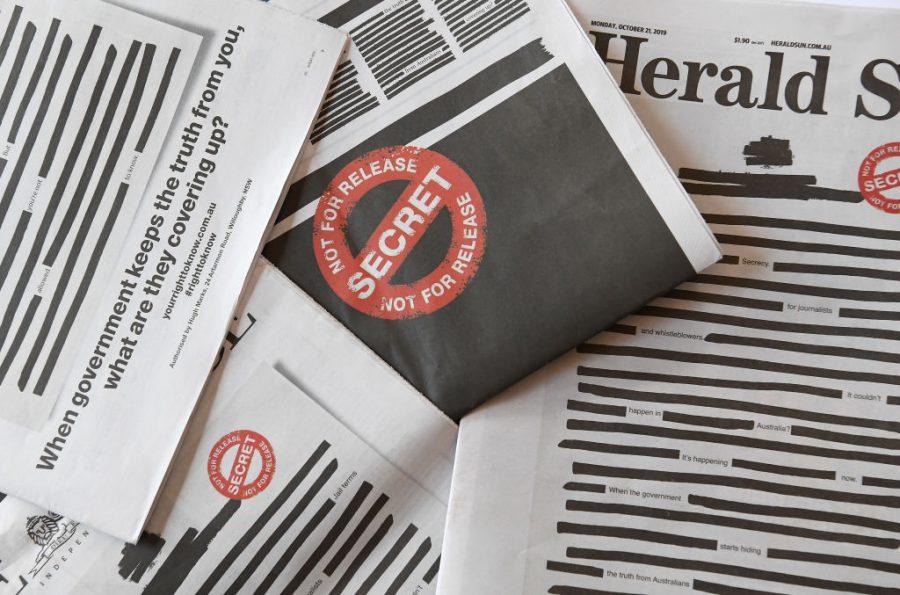
The prime minister makes a good, glib debating point: nobody is above the law, including journalists.
The problem Scott Morrison glides by is a Canberra mindset and a pile of new laws that squeeze our democracy and freedoms—the classic problem of smothering, even killing, the thing you want to protect.
If a newspaper is a nation having a conversation with itself, Australia’s major papers—and broadcasters—have united to shout at the nation.
Savour a remarkable moment in Oz journalism, when the newspapers black out their front pages to protest at the culture of secrecy.
The media’s ‘Your right to know campaign’ asks for a suite of reforms:
– The right to contest the application for warrants for journalists and media organisations;
– Exemptions for journalists from laws that would put them in jail for doing their jobs, including security laws enacted over the last seven years;
– Public sector whistle-blowers must be adequately protected—the current law needs to change;
– A new regime that limits which documents can be stamped secret;
– A properly functioning freedom of information (FOI) regime; and
– Defamation law reform.
They are all big asks, reflecting the size of the problem.
It takes much provocation for editors to stand back from the daily fight with each other. Discussion of Oz newspapers tends to descriptions like ‘polarisation’ and ‘a war of left versus right’. So it’s a significant moment when the princes of print and the queens of screen stand united, because of a ‘deep rupture in the relationship between government and media’.
Anyone who believes in journalist conspiracy theories has never seen four hacks trying to agree on where to lunch.
Hacks all rush towards a big yarn, but they spend as much time hacking at each other as reaching for the headline. Journalists catch and kill their own; see this stark instinct in the way that three generations of the Murdoch family have sought to castrate if not kill the ABC.
Professor George Williams sets out the ‘right to know’ case:
Australia leads the world in enacting national security and counter-terrorism laws. About 75 have been passed by our federal parliament since September 11, 2001. This far exceeds the number of similar laws passed by Britain and the US. Our laws also differ because they go further in heightening government secrecy. They represent an assault on freedom of the press unique to Australia.
Australia has a statute book littered with laws that enable sources to be identified, whistleblowers to be shut down and journalists to be jailed. Time after time when politicians were questioned about these laws, they said that they would not be used against the media.
A recent audit put the total number of substantive anti-terror laws since 2001 at 82, with a further six bills before parliament or about to be introduced.
Canberra’s habitual obsession with secrecy has fed on security fears in the age of terrorism, the age of cybercrime, and now the new age of great-power competition. No matter the security problem, more secrecy is the answer.
Secrecy and security are different things. Secrecy is binary, while security has many different degrees and aspects. Canberra’s obsession means secrecy is the all-purpose tool. Make it secret to make it safe.
The public service makes secrecy a default setting. With secrecy as the central operating imperative, the tough argument inside the bureaucracy is always about how much, if anything, to make public.
Up in Parliament House and in the executive wing, the public service secrecy obsession feeds into the fight over power and policy. The political class knows knowledge is power, and secrecy builds the ammunition store.
Politicians and minders constantly trade and exchange information. If you do it yourself, it’s background or briefing. When done to you, it’s a dangerous leak and breach of security and should be met with the full force of the law.
The hypocrisy of Canberra’s great secrets apparatus is that the majority of ‘breaches’ come from politicians. Journalists trade in leaks, so they seldom talk too loudly about the two-faced nature of ministers who habitually trade in cabinet documents and secret papers; nobody is above the law, but the lawmakers give themselves a lot of leave-passes.
The cumulative effect of all the new security laws is a breaking down of old inhibitions and tacit no-go areas.
Police raids on journalists certainly galvanised the media. But I was struck at the supine response from politicians when the Australian Federal Police raided Parliament House in 2016. The great issue of national security at stake? The plods raided the font of Oz democracy because of a leak about the cost of the national broadband network!
In the pre-9/11 era, such an assault on parliamentary privilege would have been an outrage. Careers would have crashed and ministers would have been assailed. No more. The culture of secrecy and the need for security combine to eat at much, even the independence of parliament.
Journalists aren’t pleading for special privileges. The watchdogs are barking about stuff that is biting everyone.
The hacks muse about the need for a media freedom act to restore some balance. And as Williams notes, ‘We are the only democratic nation without strong national protection for freedom of speech and of the press.’
Australia is working on giving constitutional recognition to Aboriginal and Torres Strait Islander peoples.
After that, it’s time to give constitutional protection to freedom of speech and freedom of the press.